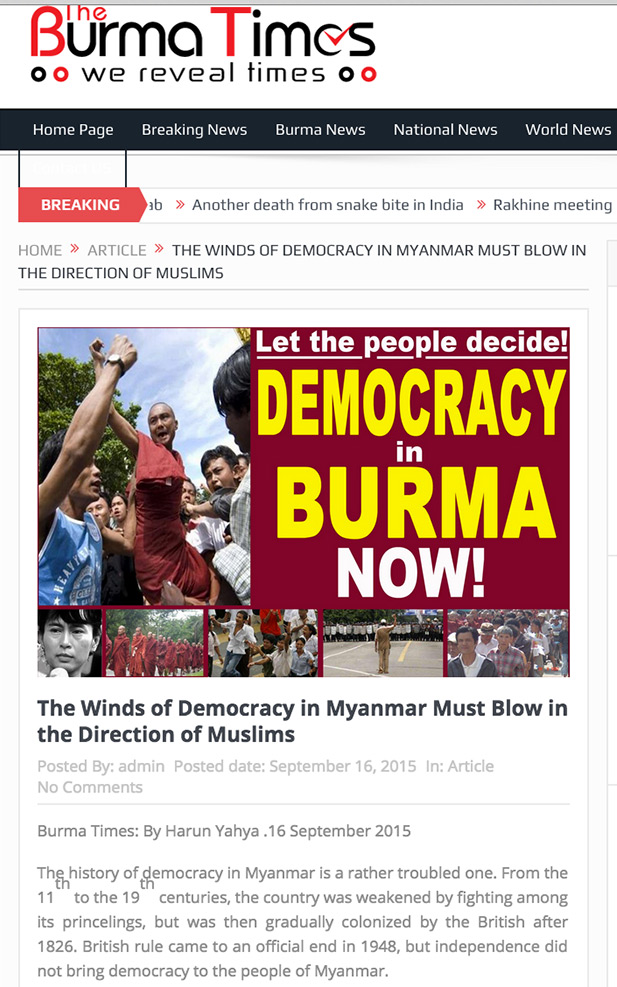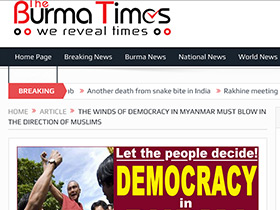
The history of democracy in Myanmar is a rather troubled one. From the 11th to the 19th centuries, the country was weakened by fighting among its princelings, but was then gradually colonized by the British after 1826. British rule came to an official end in 1948, but independence did not bring democracy to the people of Myanmar.
Although efforts were made to change the repressive military regime led by General Ne Win since 1962 with constitutional changes in 2008, elections were only held in 2010. These elections were thought by many to represent a major step toward a republican regime. The results, however, showed that the military regime had not, in practice, come to an end, because the military-backed Union Solidarity and Development Party received 80% of the vote.
Was this outcome an expected one?
The response of the National League for Democracy, led by Aung San Suu Kyi, to that question would of course be in the affirmative. The opposition boycotted these elections, citing widespread irregularities across the country. Later on, in by-elections on December 23rd, 2012, the National League for Democracy won 40 of the 45 seats vacated after some deputies in the 664-member Parliament were appointed to various posts. Following those elections, the Western world announced that significant democratic progress in line with Western norms was being made in Myanmar. Indeed, leading politicians of the time such as U.S. Secretary of State Hillary Clinton, British Prime Minister David Cameron and EU High Representative for Foreign Affairs Catherine Ashton signaled that the West had ratified Myanmar's fledgling democracy by visiting the country.
The year 2012 was a turning point in Myanmar’s opening up to the outside world. The EU lifted economic sanctions on Myanmar in April 2012 and the U.S. followed in July of the same year. Western companies decided that Myanmar, with its rich resources and cheap labor force, was now fully democratized.
At this point the following question arises; if Myanmar has democratized in the eyes of the West, where does the repression of the Muslims of Rakhine stand in that process of democratization?
In fact, Rakhine Muslims were oppressed even back in the days of British rule but at that time the Muslim and Buddhist peoples were oppressed equally. However, the oppression of Muslims worsened during the era following the 1962 military junta. Indeed, while the military regime wished to strengthen the economy by exploiting the country's rich natural resources such as oil, natural gas, precious stones and uranium, it had no qualms about seizing those resources, and the lands, held by Muslims and other minorities. Muslims were thus deprived of the right to own property. However, the oppression of Muslims went even further than that.
Myanmar used to be closed to the outside world, especially during the period of military rule. There is usually little outside intervention in those countries under military rule, and the military rulers typically ignore what feeble criticism there is. Yet the West is now claiming that Myanmar has democratized. So where does the repression of the Muslims of Rakhine stand in that process of democratization? If, as alleged, the country has indeed democratized, why are Muslims risking death to find shelter in other countries in makeshift boats out on the open sea? The question of the maltreatment they suffer when they reach those countries is a whole different issue, of course.
In fact, Myanmar cannot be regarded as being even on the first rung of democracy because Muslims continue to be martyred, the numbers of Muslims imprisoned or tortured is largely unknown, and what happens to them after that remains a mystery. Their women are raped and generally speaking, the Muslims of Myanmar are brutalized, tyrannized and oppressed in a most appalling manner. What is more, not a single mosque has been built in the last 20 years, while existing ones are not allowed to be maintained. The only material they can use to build their homes is timber, and if those houses burn down by accident, the punishment is up to six months imprisonment. They have to pay the state taxes for every baby that is born or person who dies. Their homes and places of worship are demolished. They have no freedom of movement, yet have to pay taxes to move from one place to another. They must have a Buddhist partner if they want to start a business. They need permission to marry, and then both the man and woman have to pay additional taxes to the state. They cannot work in public offices and cannot make use of any public institutions, even hospitals. Their children can only study as far as high school. They are not allowed mobile phones, land lines or motorized vehicles. Since they have no identity documents, they have no right to vote or to stand for office.
Even a single one of these is considered a violation of democracy in the eyes of the West. But for the collapsing Western economies, Myanmar is a new source of raw materials and a place where they can engage in production. It is also an outpost that the USA can use against an increasingly powerful China. For these reasons, the Western world chooses to remain silent in the face of these grotesque violations of democracy. They prefer to imagine an imaginary democracy in Myanmar and hide the violations of Muslims’ rights behind that fantasy. Otherwise they would themselves be supporting human rights violations and this would be in conflict with their own democratic norms.
But is it really possible to conceal the fact that the concept of democracy has never developed in the country by ignoring people suffering poverty, hardship and mistreatment, by hiding behind a fantasy and by refusing to heed cries for help?
Of course not. Much needs to be done to show that consciences have not withered away entirely. The international community needs to make its presence felt to the Myanmar government in a much stronger fashion. Myanmar is a country that is still developing in economic terms. It has rich natural resources but it lacks the technical knowledge and equipment to make use of these resources. It is therefore essential for both the Western world and the Association of Southeast Asian Nations (ASEAN) to impose sanctions to compel the government of Myanmar to end its discriminatory policies against Muslims. The pressure on Myanmar's government to end its repression would be more powerful through economic sanctions. Condemnation, criticism and relatively insignificant amounts of humanitarian aid cannot bring democracy and longed-for freedom to the people of the region. International measures that will directly impact Myanmar therefore need to be taken. Islamic countries must be in the vanguard of this, as the spirit of brotherhood in Islam requires. Everyone must do all in his power until the Muslims of Rakhine enjoy the human rights and quality of life everyone in the world deserves.
Adnan Oktar's piece on Burma Times:
http://burmatimes.net/the-winds-of-democracy-in-myanmar-must-blow-in-the-direction-of-muslims/


